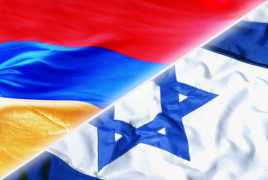 The recent tension between Turkey and Israel has over the last year affected the fronts of alliances in the region, leading to pursuits for new forms of alliances subsequent to the current crisis.
The recent tension between Turkey and Israel has over the last year affected the fronts of alliances in the region, leading to pursuits for new forms of alliances subsequent to the current crisis.
Back then, the Azerbaijani and Armenian media adopted differing approaches vis-à-vis the fate of the Mavi Marmara volunteers. Armenia has made statements over Turkey’s position by leaving the door open for possible cooperation with Armenia.
Human rights organizations have held anti-Israel protests, the largest and biggest in the history of the nation in Azerbaijan, because of the Mavi Marmara incident. The protesters urged Israel to abandon its stance and chanted slogans in favor of Turkey in an attempt to express solidarity. The Azerbaijani media has extensively covered the incident to inform the public and support Turkey’s position and, for the first time, the people held extensive protests against Israel in the country. The stakeholders have displayed different attitudes in Armenia, which seeks to normalize ties with Turkey. While the statements referring to the interests of Armenia involved a number of contradictions, the relevant actors discuss how Armenia would make gains out of the Turkish-Israeli crisis. An expert, Ruben Mehrabyan, speaking to an Armenian news portal during the Turkish-Israeli crisis, noted that the primary reason for the Israeli raid was to maintain Israel’s national security. In respect to the political outcomes of the matter, Mehrabyan made the following comment: “We should remember that Turkish-Israeli relations have visibly deteriorated. This is not Israel’s problem; it is a problem caused by Turkey’s attempt to expand its sphere of influence in the Middle East.”
An analysis published in the Armenianow news portal argued that this issue is an outcome of the escalating row in 2009 — when Turkish Prime Minister Recep Tayyip Erdoğan walked off the stage at the World Economic Forum in Davos following a debate over Israel’s incursion into Gaza — that the Turkish foreign policy is harming its prospects for normalizing ties with Armenia with such reckless moves and that the Western world is not pleased with Turkey’s policies. Turkey’s recent attempts to improve ties with Iran create some sort of dilemma. According to experts, the tension that started in Davos is giving birth to consequences. Ruben Melkonyan from Yerevan State University argues that the Armenian genocide may be recognized in the Knesset, Israel’s legislature, in the new legislative term and that Jewish lobbies may extend the necessary support on this matter.
AZERBAIJAN’S REALITY AND NEW TACTICS
Israel has been improving its military ties with Azerbaijan, which meets 30 percent of Israel’s demands for oil and natural gas. To this end, Israel provides extensive services, including the modernization of unmanned aerial vehicles (UAVs), satellite systems and automatic weapons. Media reports note that subsequent to Israeli President Shimon Peres’ visit to Azerbaijan in 2009, a deal was brokered to build a facility for manufacturing UAVs, purchase large amounts of weapons and arms and sell TAR-21 automatic weapons. Regardless of the political developments, the Armenian lobby, aware that it should not ignore the ongoing reality of regional cooperation moves, is uncomfortable with this cooperation; however, it also believes that Israel will take constructive steps to improve relations with Armenia.
The predictions held by the Armenian side on the emergent process include the following: The Israeli parliament will recognize the 1915 events as genocide in the aftermath of the tense relations with Turkey. Israeli lobbies around the world will adopt a new stance with respect to the genocide issue and work to make sure that Armenia is supported on that matter. During the process, minorities in Turkey may face extra assaults. The Jewish and Armenian minorities in particular may be harassed by Turks. The minorities that experienced 1955 should be ready for new incidents. If it remains committed to its attempts to become an influential power in the region, Turkey will have crises with other neighbors in the long run. A Yerevan-Athens-Tel Aviv axis may emerge and replace the changing Ankara-Baku-Tel Aviv defense cooperation. To this end, the main theme in Armenian President Serzh Sarksyan’s visits to Greek Cyprus and Greece was opposition to Turkey. Developments that raise hopes for the materialization of these predictions include visits by Israeli authorities to Yerevan, positive approaches in the Israeli media vis-à-vis the Armenian issue, the statements of some Israeli authorities on the 1915 events and the ongoing crisis with Turkey. However, considering that it would not be eager to undermine the argument that the Jews are the only nation that suffered from genocide, Israel may not be so generous to take steps to recognize the 1915 events as genocide.
The enhanced cooperation between Israel and Azerbaijan in the military and energy fields determines Israeli policy towards Nagorno-Karabakh. The projected cooperation between Israel, Greece and Greek Cyprus focusing on opposition to Turkey alone will not prevent the isolation and alienation of Armenia in the region, and realpolitik will not be able to save this country from its dependence on Russia, which has declared it would recognize Palestine as an independent state.
MEHMET FATİH ÖZTARSU / EXPERT OF STRATEGIC OUTLOOK
*.html

Leave a Reply